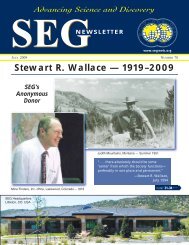Download - Society of Economic Geologists
Download - Society of Economic Geologists
Download - Society of Economic Geologists
You also want an ePaper? Increase the reach of your titles
YUMPU automatically turns print PDFs into web optimized ePapers that Google loves.
14 SEG NEWSLETTER No 65 • APRIL 2006... from 13The Mineral Exploration Business: Innovation Required (Continued)Under the first point, the main objectivesare to examine and if necessaryrevamp entrenched routines, organizationalboundaries, and incentives toencourage rapid exploration.The second point emphasizes thenecessity to embrace failures that occurearly in the development process(exploration program) and advanceknowledge significantly. A critical yetdifficult concept for management tounderstand, and even more so forinvestors, is that failures should not beconfused with mistakes. Thomke (2001)points out that mistakes produce littlenew or useful information and aretherefore without value. A poorlyplanned or badly conducted experiment(exploration), for instance, might resultin ambiguous data, forcing researchers(explorationists) to repeat the experiment(drill again). Another mistake forexample, is repeating a prior failure orbeing unable to learn from that experience.Unfortunately, even the best organizations<strong>of</strong>ten lack the managementsystems necessary to distinguish carefullybetween failures and mistakes.The third point is probably the mostsignificant. Thomke (2001) uses IDEO, aleading design firm in Palo Alto,California, as an example <strong>of</strong> followingthe principle <strong>of</strong> the three Rs: Rough,Rapid, and Right. The final R recognizesthat early prototypes may be incompletebut can still get specific aspects <strong>of</strong>the product right. In terms <strong>of</strong> E&D, thiscould be re-phrased as “recognizes thatearly exploration models may beincomplete but can still get specificaspects <strong>of</strong> the style <strong>of</strong> mineralization,the important controls on that mineralization,and the spatial scale right.”Establishing such a process generatesimportant information when it is mostvaluable: at the early stages <strong>of</strong> exploration.For the investor, the importance<strong>of</strong> adding value (i.e., to the asset <strong>of</strong> thecompany) or a property is good news.In addition to saving time and money,exploiting early information helpsproduct developers (explorationists) tokeep up with customers’ (major mininghouses) preferences that might evolveover the course <strong>of</strong> a project.Thomke (2001) introduces the benefits<strong>of</strong> “front-loaded development”—i.e.,solving problems early. In terms <strong>of</strong> anexploration project, this requires theinput <strong>of</strong> mining engineers, metallurgists,legal-fiscal back-up, as well asgeology to determine if a specific property(product) will make it to the market(major mining houses). The solving <strong>of</strong>problems early equates to shorteningthe time frame <strong>of</strong> exploration.Lastly, Thomke (2001) notes that theincreased automation <strong>of</strong> routine experimentswill not remove the need for thehuman element in innovation.However, he points out that automationwill allow people to focus on areaswhere their value is greatest, i.e., ingenerating novel ideas and concepts,learning from experimentation, andultimately making decisions thatrequire judgment.In E&D terms, advances in databasemanagement and better geochemicaland geophysical data do not removethe human element in exploration.However, they do allow geologists t<strong>of</strong>ocus on interpreting their data better,learning from on the ground exploration,and ultimately making decisionson the economic potential <strong>of</strong> a prospector area. The value <strong>of</strong> the geologist as aknowledge worker actually increases,because he is, firstly, in a position to usehis knowledge to decide if the data are<strong>of</strong> value, especially if the data are froman area he is familiar with. Secondly,they can focus on target areas withpotential, rather than doing routinefieldwork to define targets. Finally, thegeologist knowledge worker is in a positionto turn over prospects rapidly inorder to define quality targets, thusfocusing on shortening the time fromexploration to discovery.CONCLUSIONSMineral exploration, although intimatelylinked with the mineral extractionand processing industry, is a distinctivebusiness sector. E&D is the R&Dsector <strong>of</strong> the mining industry, and canbe defined as the generation and application<strong>of</strong> scientific knowledge to the discovery<strong>of</strong> new orebodies, either by grassrootsexploration or in the vicinity <strong>of</strong>existing mines.There is a shortage <strong>of</strong> new preciousand base metal exploration, development,and production projects in thepipeline. This shortage could significantlyreduce new mine development inthe near future. This follows a six-yeardecline in exploration activity, andeven though exploration expenditureshave recovered in the past two years,the decline is compounded by the loss <strong>of</strong>senior geologists from the industry andthe shortage <strong>of</strong> new graduates.The exploration business needs toattract investment, and if explorationgeologists are going to play a leadingrole in this business, they must innovate.The business must get better in terms <strong>of</strong>shortening the time frame to discovery,and being as cost effective as possiblewithout wasting vital funds. It must als<strong>of</strong>ind better financial models and mustlearn to manage people better. People,i.e., the quality <strong>of</strong> the geological team,are the only competitive advantage anexploration company has over its rivals.The ability to motivate these people is apart <strong>of</strong> the innovative capacity thatmanagement must develop.ACKNOWLEDGMENTSWe would like to thank the manypeople with whom the topic <strong>of</strong> explorationhas been discussed over theyears. We are particularly indebted tocritical reviews by Richard Sillitoe,Owen Bavinton, Graham Brown, FredDaley, John Thompson, Bill Williams,and Walter Sellmer, to name a few. TheSEG reviewers kindly pointed out manyaspects <strong>of</strong> the original draft that neededcritical rewriting and we are muchindebted to them.REFERENCESBailly, P.A., 1979, Managing for ore discoveries:Mining Engineering, v. 31, p. 663–671.Brethour, P., 2004, Oil: Too much disciplineat $50: The Globe and Mail, October 2,2004, p. B5.Burton, P., 2003, Elephants: World Gold,April 2003, p. 1.Christensen, C.M. and Overdorf, M., 2000,Meeting the challenge <strong>of</strong> disruptivechange: Harvard Business Review, March-April 2000, p. 67–76.Doggett, M.D., 2000, Exploration in the newmillennium: Will it be pr<strong>of</strong>itable?: Paperpresented at the Prospectors andDevelopers Association <strong>of</strong> Canada AnnualMeeting, March 2000, 6 p.Dow, J.A.S., 2002, Exploration geology—business and leadership challenges for thefuture: SEG Newsletter, no. 50, July 2002, p.17–21.Drucker, P.F., 1985, Innovation andentrepreneurship: New York, Harper &Row, 277 p.——1999, Management challenges for the21 st century: New York, HarperCollinsPublishers, 224 p.






